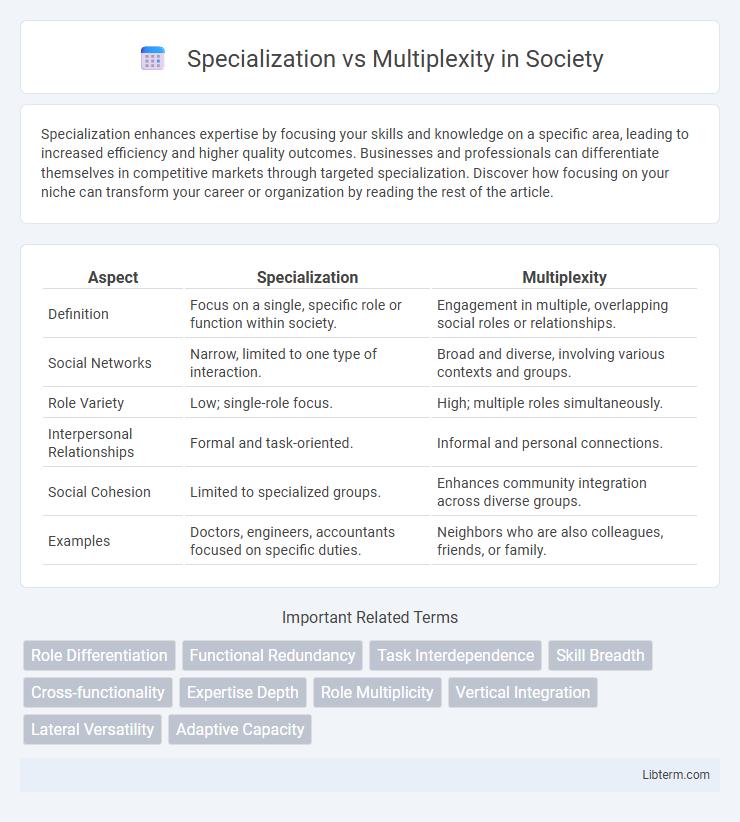Specialization enhances expertise by focusing your skills and knowledge on a specific area, leading to increased efficiency and higher quality outcomes. Businesses and professionals can differentiate themselves in competitive markets through targeted specialization. Discover how focusing on your niche can transform your career or organization by reading the rest of the article.
Table of Comparison
| Aspect | Specialization | Multiplexity |
|---|---|---|
| Definition | Focus on a single, specific role or function within society. | Engagement in multiple, overlapping social roles or relationships. |
| Social Networks | Narrow, limited to one type of interaction. | Broad and diverse, involving various contexts and groups. |
| Role Variety | Low; single-role focus. | High; multiple roles simultaneously. |
| Interpersonal Relationships | Formal and task-oriented. | Informal and personal connections. |
| Social Cohesion | Limited to specialized groups. | Enhances community integration across diverse groups. |
| Examples | Doctors, engineers, accountants focused on specific duties. | Neighbors who are also colleagues, friends, or family. |
Introduction to Specialization and Multiplexity
Specialization refers to the concentration of skills or functions within a specific domain, enhancing efficiency and expertise in that area. Multiplexity involves the presence of multiple types of relationships or interactions within a single social network or organizational structure, increasing complexity and connectivity. Understanding the contrast between specialization and multiplexity is crucial for analyzing social dynamics and organizational behavior.
Defining Specialization in Modern Fields
Specialization in modern fields refers to the concentration of expertise and skills within a narrow domain, allowing professionals to develop deep knowledge and highly refined capabilities. This focused approach enhances efficiency and innovation by enabling individuals to master specific tasks or concepts crucial to advanced industries like medicine, technology, and law. Specialization drives competitive advantage and technological progress by fostering expert understanding and targeted problem-solving.
Understanding Multiplexity: A Multidisciplinary Approach
Understanding multiplexity involves analyzing the multiple types of relationships that connect individuals or entities within a network, emphasizing the complexity and richness of social interactions across various contexts. This multidisciplinary approach integrates insights from sociology, psychology, communication studies, and network theory to explore how overlapping ties influence behavior, information flow, and social cohesion. Recognizing multiplexity enhances the accuracy of models predicting social dynamics compared to specialization, which isolates single types of connections for analysis.
Key Benefits of Specialization
Specialization enhances productivity by enabling workers to focus on specific tasks, leading to higher efficiency and expertise in their roles. It reduces training time and increases skill depth, contributing to improved quality and faster output. Organizations benefit from cost savings and innovation through focused knowledge and streamlined processes.
Advantages of Multiplexity in Today’s World
Multiplexity enhances social networks by allowing individuals to maintain diverse, overlapping connections across multiple contexts such as work, family, and community, which increases trust and resource sharing. This interconnectedness fosters resilience and adaptability in rapidly changing environments, critical for professional growth and problem-solving in today's complex world. Multiplex relationships also improve communication efficiency and collaboration, driving innovation and social support more effectively than specialized, single-domain interactions.
Comparing Skill Development: Specialist vs. Multiplex
Specialization fosters deep expertise in a specific field, enabling mastery of complex techniques and advanced problem-solving skills tailored to that domain. Multiplexity promotes versatile skill development across multiple areas, enhancing adaptability and interdisciplinary understanding but potentially limiting depth. Comparing skill development, specialists achieve higher proficiency in niche tasks, while multiplex individuals cultivate broader competencies valuable for diverse challenges and innovation.
Career Growth: Which Path Brings More Opportunities?
Specialization in a specific field deepens expertise and often leads to higher demand and salary growth in niche markets, enhancing career advancement opportunities. Multiplexity, or developing diverse skills across multiple domains, fosters adaptability and can open doors to varied roles, especially in dynamic industries valuing cross-functional knowledge. Career growth benefits depend on industry trends, individual goals, and the ability to leverage either deep specialization or broad multiplexity effectively.
Challenges Faced by Specialists and Multiplex Individuals
Specialists face challenges such as limited adaptability and vulnerability to market or technological changes due to their narrow skill set. Multiplex individuals encounter difficulties in balancing diverse roles and managing conflicting demands across different social or professional networks. Both specialization and multiplexity require strategic navigation of trade-offs between depth and breadth of expertise to optimize long-term success.
Industry Trends: Who Thrives—Specialists or Multiplexers?
Industry trends reveal that specialists thrive in highly technical fields requiring deep expertise, such as biotechnology and artificial intelligence, where innovation depends on profound knowledge and focused skill sets. Conversely, multiplexers excel in dynamic, interdisciplinary sectors like digital marketing and product management, leveraging diverse competencies to adapt quickly and drive holistic solutions. Market demand often favors multiplexity for agility and integration, yet specialization remains crucial for breakthrough advancements, highlighting a competitive balance influenced by technological complexity and organizational strategy.
Choosing Your Path: Factors to Consider
Specialization offers deep expertise in a specific field, enhancing career opportunities in niche markets with precise skill demands. Multiplexity involves cultivating diverse competencies across multiple disciplines, promoting adaptability and broader problem-solving abilities in dynamic work environments. Factors to consider when choosing your path include industry trends, personal interests, long-term career goals, and the value of either depth or breadth in your professional skill set.
Specialization Infographic

 libterm.com
libterm.com